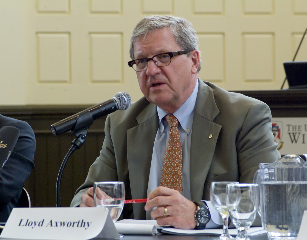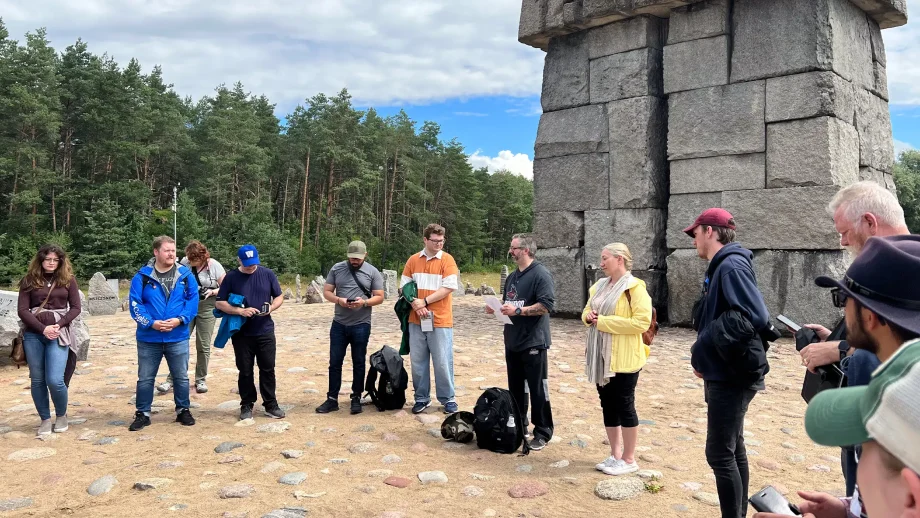 TORONTO, ON – Arctic Climate Change is one of the most crucial foreign and environmental policy issues facing Canada, but it has largely been ignored by all political parties in the current federal election, says Dr. Lloyd Axworthy, President & Vice-Chancellor of The University of Winnipeg.
TORONTO, ON – Arctic Climate Change is one of the most crucial foreign and environmental policy issues facing Canada, but it has largely been ignored by all political parties in the current federal election, says Dr. Lloyd Axworthy, President & Vice-Chancellor of The University of Winnipeg.
Axworthy made the remarks today at an event to discuss a groundbreaking report on Arctic Climate Change released by an international civil-society commission supported by the U.S.-based Aspen Institute.
“As Canadians once again go to the polls to choose a new Parliament, the future of the Arctic needs to be part of the election debate. So far, no one is talking about it,” said Axworthy, who served as a commissioner with the Aspen Institute’s Commission on Arctic Climate Change. “With the implications of climate change on the Arctic ecosystem, for Indigenous and northern communities or for Canada’s sovereignty, the Arctic will be one of Canada’s most important foreign policy priorities in the 21st Century. Canadians need to know where all of their political parties stand on this critical issue.”
Canada’s North a Priority
Axworthy added that while the Harper Government should be credited for making Canada’s North a priority, there are still many outstanding questions that need to be debated in the federal election. These include questions regarding multilateral cooperation, the role of Indigenous peoples, and rules ensuring economic development, transportation and trade do not put the delicate ecology of the Arctic region at risk.
Furthermore, Axworthy called on the next government to designate the Arctic region as a national gateway and corridor.
The Aspen Commission’s report and recommendations, concluded Axworthy, offers a road map for Canada and all Arctic nations to move forward. It promotes an important new perspective on the level of international cooperation and stewardship that will be necessary to manage the Arctic marine environment in anticipation of the climate change impacts the region now faces.
The report entitled The Shared Future identifies strategies and approaches to help conserve the critical biological resources of the Arctic Ocean and to assure sustainable livelihoods of the communities that depend on these resources for their survival. The report focuses on several recommendations to strengthen the management of the Arctic marine environment in ways that will sustain the natural resilience of the Arctic’s multiple interdependent ecosystems. A key recommendation is that “Arctic governments should take immediate steps to begin developing an Arctic Marine Conservation and Sustainable Development plan by 2012, in collaboration with civil society and other interested parties.”
Sustainable Development
“The Aspen Commission on Arctic Climate Change employed an extensive dialogue process to develop recommendations that can safeguard both the sustainable development and conservation of the Arctic for the future,” said David Monsma, executive director of the Aspen Institute’s Energy and Environment Program and the Aspen Arctic Commission, who also attended today’s panel at Massey College at The University of Toronto. “The Commission believes the recommendations for long-range international cooperation to create a more holistic ecosystem-based management approach in the Arctic marine environment, along with implementation of a marine spatial planning process, are critical to safeguard this vulnerable area.”
Indigenous peoples and communities need to be recognized as leaders in shaping the future of the Arctic region added Inuit Leader and Nobel Peace Prize nominee, Sheila Watt-Cloutier. “I have been honored to serve with this remarkable group of civil society leaders from so many fields and perspectives,” said Watt-Cloutier, who also served on the Aspen Commission. “That we were able to come to agreement on such a strong and innovative set of recommendations for preserving the future of the Arctic and its communities, and for ensuring that local indigenous knowledge informs regional and glob al decision making, gives me great hope for the future of our people. It shows that, when we come together to holistically consider the impacts of climate change on human communities, ecosystems and economies, we can agree to changes that center our considerations on our shared humanity.”
For more information on the Commission and its findings and to obtain a copy of the Commission Report, please visit: www.aspeninstitute.org/arcticcommission
The Aspen Institute Commission on Arctic Climate Change was generously supported
by the Prince Albert II of Monaco Foundation. Today’s panel was hosted by the Walter &
Duncan Gordon Foundation in Toronto: www.wdgf.ca
– 30 –
MEDIA CONTACT
Dan Hurley, Associate Vice-President (External Affairs), The University of Winnipeg
c. 204-290-4525 / d.hurley@uwinnipeg.ca




